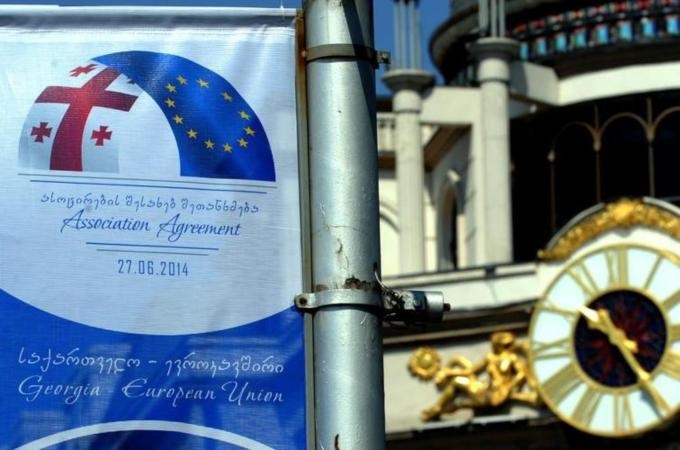
Is Georgia getting closer to the EU, but farther from NATO?
Publication: Eurasia Daily Monitor Volume: 11 Issue: 121
By:

On June 27, Georgian Prime Minister Irakly Garibashvili signed a historic Association Agreement between Georgia and the European Union (EU). People in Tbilisi celebrated this event as a national holiday. Political forces in the country unanimously agree on the necessity and benefits of association with the EU in terms of further development of the country and bringing its institutions closer to European standards.
All political parties in Georgia welcomed the signing of the agreement with the EU, because pro-Western orientation and European integration are considered to have no alternative. Even the few fringe groups that usually advocate for closer ties with the Eurasian Union of Vladimir Putin (EDM, April 1), could not openly oppose association with the EU, as this move opens up new opportunities for Georgia, allowing it access to the largest market in the world and to advanced technological innovation.
Experts foresee fewer risks to Georgia’s economy after signing the agreement compared to Ukraine. “Russia has imposed practically a full economic embargo on Georgia since 2006. The embargo lasted six years, during which the Georgian producers sought and partly found new export markets for wine, mineral water and agricultural products,” according to Nika Imnaishvili, analyst with GHN informational agency (Author’s interview, June 27). “Only recently Georgian exporters were allowed to renew exports to the Russian market. But since Georgia’s share of the Russian market is marginal after many years of embargo, unlike in Ukraine, Russia is unable mobilize support of influential political and business groups or social and regional elites to resist European integration,” concluded Imnaishvili.
During his visit to Tbilisi in June, European Commission President José Manuel Barroso confirmed that the EU was ready to accept Georgia as a partner, open its market and allow access to the latest technology for further development (neurope.eu, June 13). It is also important that the EU is actively engaged in the peaceful settlement of the conflicts in Abkhazia and South Ossetia (stefanwolff.com , December 10, 2009).
However, Georgia’s European integration has certain limits. The problem is not just that Georgia has no prospects for full EU membership in the intermediate term. A much more significant factor is that the EU has refused to introduce a visa-free regime with Georgia, while allowing it for Moldova (RFE/RL, June 27). Both Georgia and Moldova face very similar challenges such as unresolved territorial conflicts, social unrest and high unemployment—all of which result in illegal migration and human trafficking. Both countries also face pressure from Russia. Yet, the two countries received entirely different treatment in terms of a visa regime by the EU.
Nevertheless, an association agreement with the EU is an important step toward Georgia’s integration into a new system that is significantly different from the one Georgia developed in the past decades. However, as Premier Weekly’s columnist Zurab Gogoberidze pointed out: “The irreversibility of this process is still in serious doubt, because Georgia has no security guarantees against further aggression by Russia—in direct or indirect form, as it is happening in Ukraine.” The expert further recalled: “None of the post-Soviet or post-Communist countries managed to integrate into Europe prior to their integration into NATO. All of them, without exception, first joined NATO, and only then became members of the EU.” In Gogoberidze’s opinion, “this is no accident, as military-political guarantees are the most important precondition for the countries’ free development within a new system of values and their successful integration into the Euro-Atlantic community” (Author’s interview, June 27).
Georgia still faces serious problems in this regard: as the West agreed to Georgia’s partial integration in the EU, it is still not ready to risk further confrontation with Russia by offering the country at least a Membership Action Plan (MAP), let alone putting full NATO membership on the table. As it is well known, a MAP does not guarantee actual membership, but reaffirms the right of a country to join NATO if it meets the criteria of the North Atlantic Alliance.
The resolution adopted at the 2008 Bucharest summit of the alliance said that Georgia and Ukraine “will join NATO” and “MAP is the next step for Ukraine and Georgia on their direct way to membership” (nato.int, April 3, 2008). However, after a brief—and successful for Russia—war in 2008, Georgia’s chances degraded instead of increasing. U.S. President Barack Obama said recently that Georgia was not on the path to NATO (civil.ge, March 27). German Chancellor Angela Merkel emphasized during a meeting with Prime Minister Garibashvili that granting a MAP to Georgia would not be considered at the upcoming NATO summit in Wales (civil.ge, June 2), while the president of France noted that “security of Georgia was first of all Georgia’s own responsibility” (news-region.com, May 14).
These statements somewhat dampen Georgian authorities’ optimism, but they try to pretend that nothing extraordinary is happening. Georgian Minister of Foreign Affairs Maia Panjikidze stated: “It is absolutely possible to integrate Georgia in NATO without a MAP” (georgianpress.ge, June 3). According to Georgia’s Defense Minister Irakly Alasania, it is still too early to make any prediction about a membership action plan for Georgia. “I attended the NATO–Georgia Commission meeting [in Brussels on June 4] where it was evident that the majority of our partners in NATO clearly voice that Georgia is ready for MAP,” the minister said (civil.ge, June 6). Yet, Georgian Minister for Euro-Atlantic Integration Alexi Petriashvili complained that even though his country was ready for launching membership talks with NATO, there was no such readiness on the part of some members of the Alliance (civil.ge, June 25). In response to growing frustration among Georgian officials, NATO Secretary General Anders Fogh Rasmussen promised that during the Wales summit, NATO would develop a “substantive package to help Georgia come closer to the Alliance” (civil.ge, June 25).
According to sources in the Georgian parliament, instead of granting a MAP to Georgia, NATO promises to bump up the number of Communication Officers in the organization, hold several command post exercises at the old Soviet firing field in Vaziani, near the Georgian capital, and include a Georgian detachment in the NATO Response Forces that have so far primarily responded to man-made and natural disasters. “None of these steps will have any impact on the security of Georgia,” stated the editor-in-chief of the military-analytical journal Arsenali, Irakly Aladashvili (Author’s interview, June 27).
In sum, Georgia is expected to ramp up the process of integration with the EU without any security guarantees, at a time that Moscow does not conceal its negative attitude toward the “pro-Western drift” of the post-Soviet states and tries to redirect them to the Eurasian Union. It is unclear why the Kremlin would exempt small Georgia from its attempts to draw post-Soviet countries into its orbit, when it did not refrain from launching guerilla warfare and destabilizing the largest European country—Ukraine.
Keeping Georgia at a certain distance appears to be a strategic decision by NATO’s leaders, who are trying “to avoid importing problems,” as French ex-President Nicolas Sarkozy put it (vesti.ru, November 20, 2010). However, recent events in Ukraine, a country that had officially abolished plans to join NATO under its previous president Victor Yanukovich, prove that such problems tend to “export” themselves regardless of policymakers’ efforts to contain them. Georgia, just as Ukraine, will not become closer to Russia, even under the conditions of voluntary or forced distancing from NATO. Such distancing can only create a security vacuum in the entire region, which shared borders with the Greater Middle East with its explosive problems.




